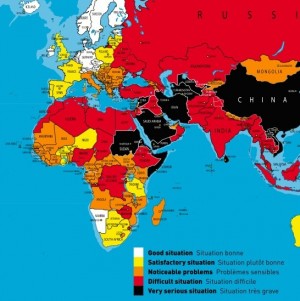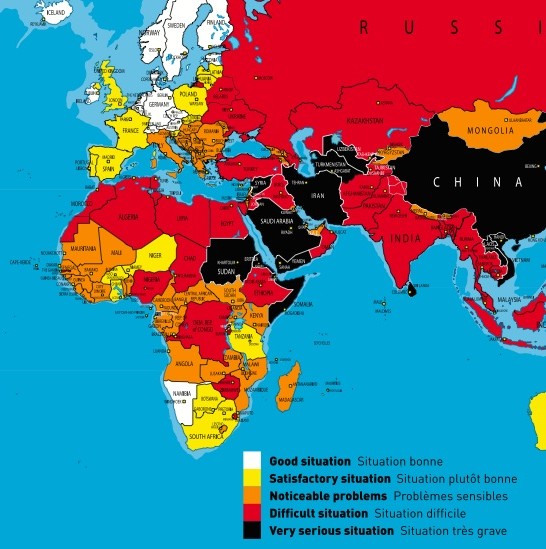
Tripoli, 4 February 2013:
Libya has shot up 23 places in the World Press Freedom Index 2013, showing how much things have changed for the media since the fall of the old regime.
The French-based NGO Reporters Without Borders (RWB) ranks Libya 131 out of the 179 countries it analysed. Libya surpassed other states in the MENA region, including Tunisia (138), Egypt (158) and Saudi Arabia (163).
Libya’s leap up the World Press Freedom Index was mainly due, the RWB analysis showed, to the overthrow of the old regime. Press freedom in 2011 had been affected by widespread restrictions and violations during the revolution.
RWB, however, pointed out that now was the time for the country to make official provision for media freedom. It noted that, after the fall of dictators, promises of media pluralism and independence were not always honoured.
“Libya’s improvements need to be confirmed by the inclusion of freedom of information in the constitution,” the RWB said, “and the adoption of laws guaranteeing this freedom and providing real protection for journalists and safeguards for media pluralism and independence.”
RWB pointed out that some of the new governments elected after the Arab Spring had later then turned on journalists.
Tunisia and Egypt, it said, “highlighted the stumbling blocks that Libya should avoid in order to maintain its transition to a free press.
“What with legal voids, arbitrary appointments of state media chiefs, physical attacks, trials and a lack of transparency,” the report said, “Tunisia and Egypt have remained at a deplorable level in the index.”
The compilation of the index reflects the degree of freedom that journalists, news organisations and ‘netizens’ (online commentators) have, as well as how a country’s authorities respect this freedom.
The country with the least media freedom was Eritrea, at 179, with Syria close behind at 176. Long-standing democracies topped the list, with Finland, the Netherlands and Norway being the top three.
“The Press Freedom Index does not take direct account of the political system,” said RWB’s secretary-general Christophe Deloire, “but it is clear that democracies provide better protection for the freedom to produce and circulate accurate news and information than countries where human rights are flouted.”
Encouraging though the RWB findings are, there is currently widespread concern amongst journalists at the manhandling of a cameraman by members of the presidential guard at the GNC two days ago. [/restrict]







